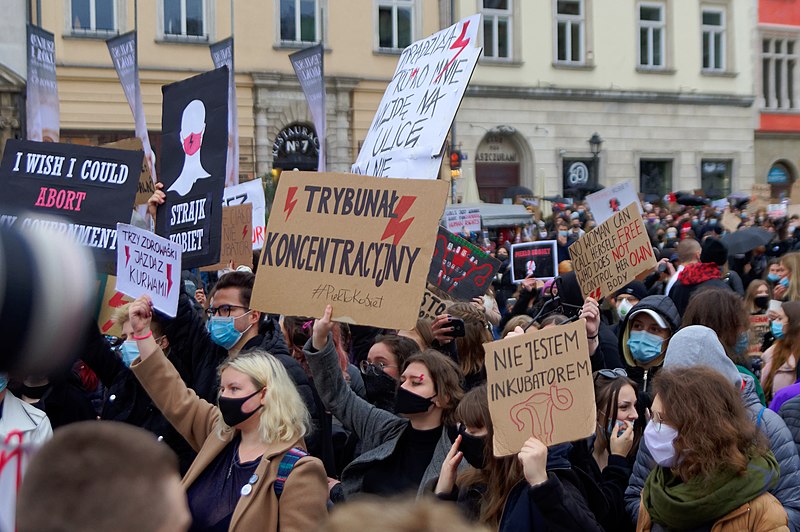In 1956, Poland legalised abortion in cases in which the woman was living under “difficult living conditions”. In practice, however, women seeking an abortion were almost always accepted and throughout the ‘60s and ‘70s, Polish women could simply request an abortion. This even allowed women from other countries like Sweden[1] to travel to Poland to receive an abortion, a sight unimaginable in light of the current situation in Poland. Where did it all go wrong?
After the fall of communism in Poland, conservative and catholic groups began campaigning for stricter abortion laws. Their wish was granted and in 1993, a new abortion law was introduced that limited the right to abortion to three specific cases. The first option consisted of the foetus forming a threat to the health of the woman. Besides this, an abortion could be performed in case of severe foetal defects or if the pregnancy was the result of a criminal act. If this does not seem strict enough, the current ruling party Prawo i Sprawiedliwość (PiS) has been proposing draconian abortion bills since 2015, when the party came to power. These bills luckily never succeeded, and every attempt of limiting women’s rights was followed by massive protests throughout Poland, often referred to as the ‘Black Protests’.[2]
In spite of this, PiS won the 2019 elections and launched their final attack: on 22 October 2020, the Constitutional Tribunal, consisting entirely of judges appointed by PiS, declared that abortion in cases of severe foetal defects violated the Polish constitution. To understand the bigger picture, in 2019, 98% of the 1100 abortions in Poland were performed on the ground of severe foetal defects.[3] The preposterous judgment of the ‘quasi tribunal’ thus resulted in a near-total ban on abortion.
The aftermath of this judgement has been the biggest protests Poland has seen since the fall of communism. Even groups who would normally not be associated with the pro-choice movement joined the protests, including farmers, taxi drivers and mineworkers. Hundreds of thousands of people took it to the streets and decorated their protest signs with slogans like “Jebać PiS” meaning “Fuck PiS” (often displayed as ***** ***), “Bardzo proszę wypierdalać” which translates to “Please get the fuck out” or “Kot może zostać, rząd może wypierdalać” meaning “The cat can stay, the government can fuck off”, referring to the cat of the leader of PiS.
As a (half) Polish woman, I find it ridiculous that in 2020 I still have to stand on a square in The Hague[4] holding a sign with “my body, my choice”. Access to a safe abortion is after all needed to protect the human rights of women, is fundamental to a woman’s bodily integrity and forms a cornerstone to female emancipation. The barbarian judgement of the ‘quasi tribunal’ is not going to stop Polish women from receiving abortions and the women unable to travel abroad will look for other, often unsafe options. The only thing this judgement will accomplish is to show the rest of the world how the Polish government does not care for women’s rights and how it will do anything to force their ideology onto others, with no respect for human rights.
After attacks on the rule of law, the LGBTQ-community, judges, the freedom of press and so much more, this could be the straw that broke the camel’s back. Will this be the start of a new revolution? One thing is certain: Poles will not let this government walk all over them.
[1] https://sverigesradio.se/artikel/6194473
[2] https://archiwumosiatynskiego.pl/wpis-w-debacie/kalendarium-100-lat-historii-walki-o-prawo-do-aborcji-w-polsce/
[3] https://pulsmedycyny.pl/oficjalne-dane-o-legalnej-aborcji-w-polsce-1110-zabiegow-przerwania-ciazy-w-2019-r-999603
[4] I live in the Netherlands, so sadly I could not join the protests in Poland due to the pandemic.

